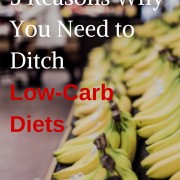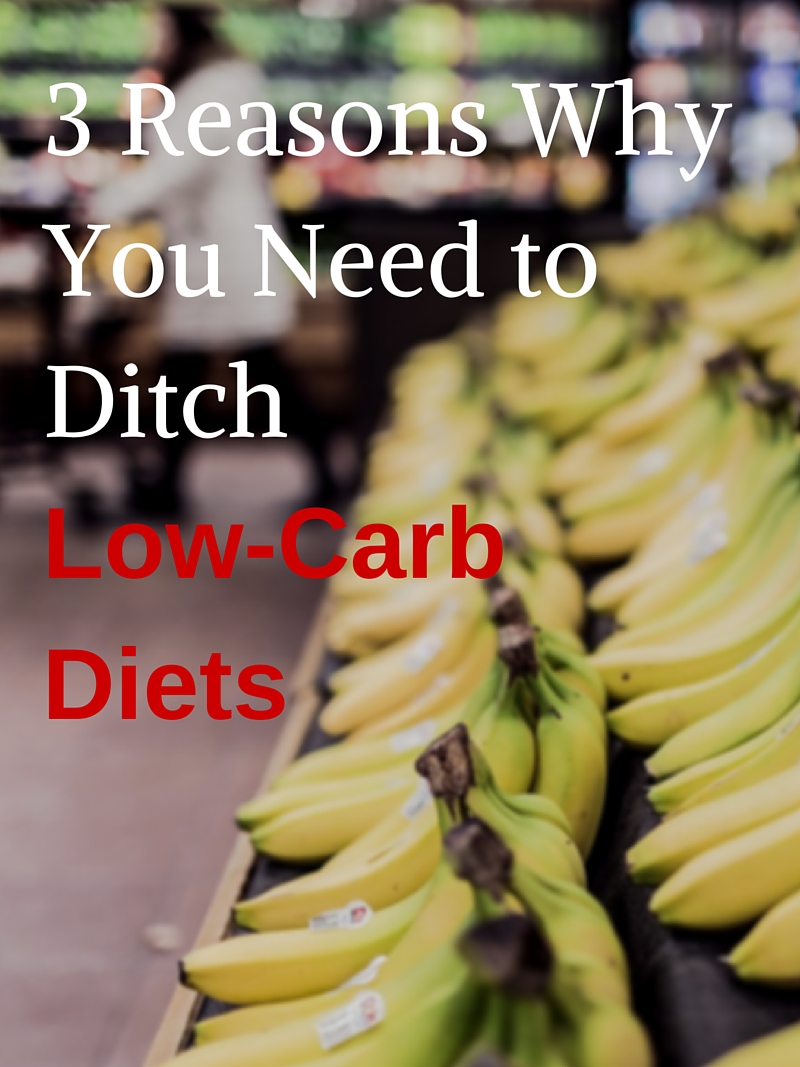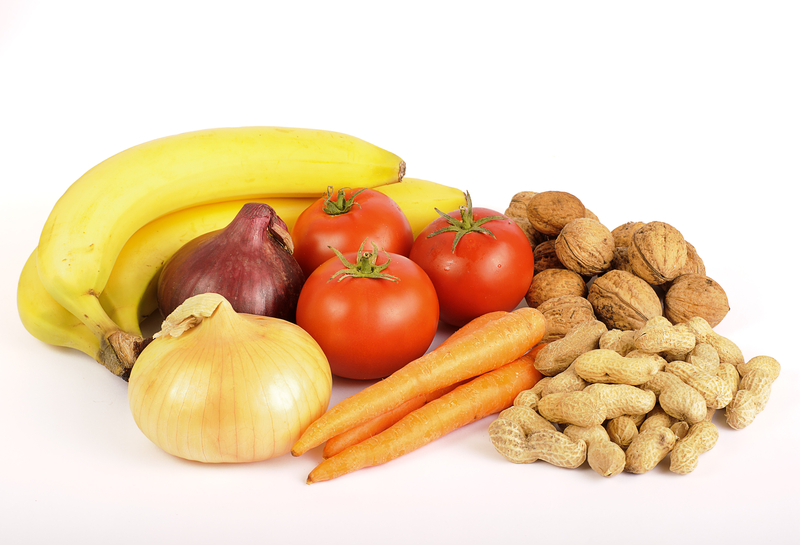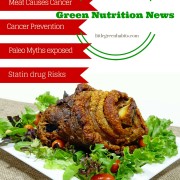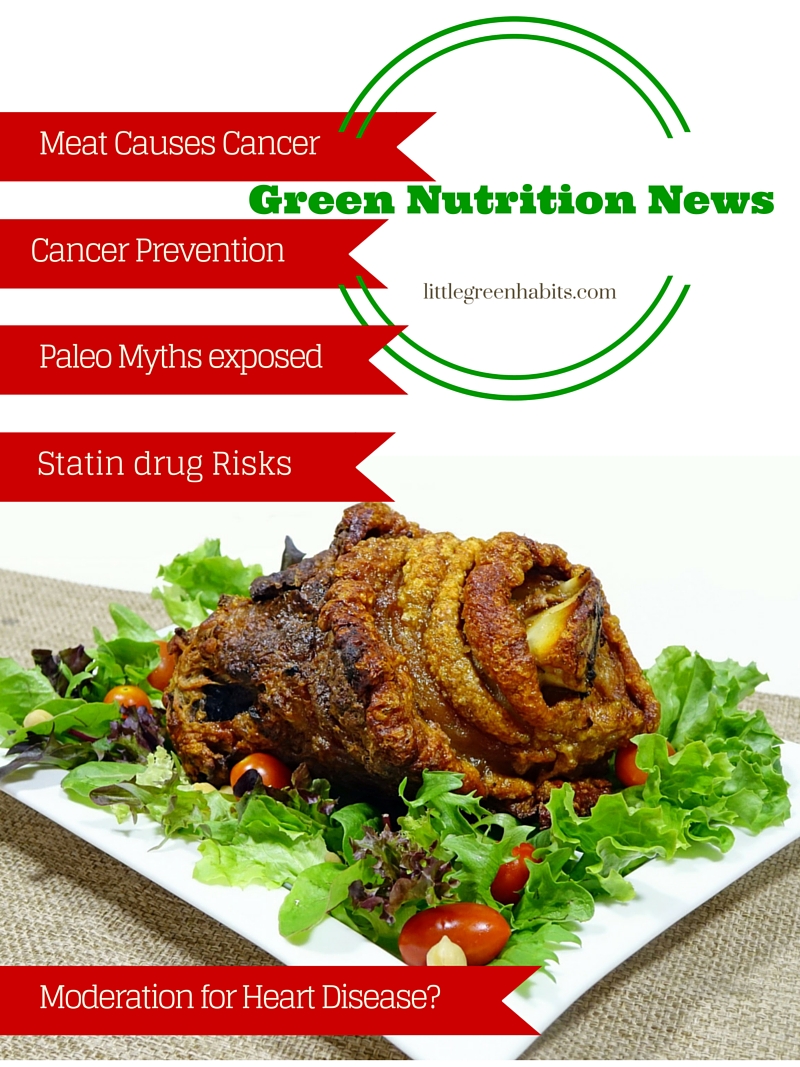
One of my top 5 nutrition news items this week focuses on recent controversial research indicating that red and processed meats cause cancer. This research, published by the WHO (World Health Organisation), received a lot of publicity online and in the mainstream media. What isn’t quite as well publicized are dietary guidelines for preventing cancer. According to the Physicians’ Committee there are 6 main dietary guidelines for cancer prevention.
There was also recent Aussie research punching more holes in Paleo dogma, and Dr Fuhrman’s advice on the dark side of statin drugs, used for people (like I was) with high cholesterol. Then, related to high cholesterol levels, a video report by Dr Michael Greger from Nutrition Facts about the dangers of moderation when it comes to preventing heart disease.
Red and Processed Meats Cause Cancer

A UN health body has ranked bacon, sausages and ham among most carcinogenic substances along with cigarettes, alcohol, asbestos and arsenic.
The World Health Organization (WHO) recently released a report that found that meat, especially processed meat, causes cancer.
A panel of 22 international experts reviewed decades of research and conducted a meta-analysis of over 800 studies on the link between red meat, processed meats and cancer.
The panel found a 17% increase in risk for colon cancer per 100 grams of red meat consumed; and an 18% increase risk with 50 grams of processed meat consumed, and quoted figures suggesting that 34,000 cancer deaths a year worldwide were attributable to diets high in processed meats.
According to Kurt Straif, an official with the World Health Organisation’s International Agency for Research on Cancer, which produced the report:
“For an individual, the risk of developing colorectal cancer because of their consumption of processed meat remains small, but this risk increases with the amount of meat consumed.”
“In view of the large number of people who consume processed meat, the global impact on cancer incidence is of public health importance.”
Researchers also found links between red and processed meat products and stomach, pancreatic, and prostate cancers.
*Yet another recent study found that two or more servings of red or processed meat a week can increase your risk for colorectal cancer.
As researchers looked at dietary data from the UK Biobank, encompassing 500,000 men and women, for red meat consumption and bowel cancer incidence rates. Participants who ate red meat four or more times per week had a 42% increased risk for colorectal cancer, compared with those who ate it less than once per week.
An estimated 21% of bowel cancers in the UK are linked to eating red and processed meat.
Dietary Guidelines for Cancer Prevention
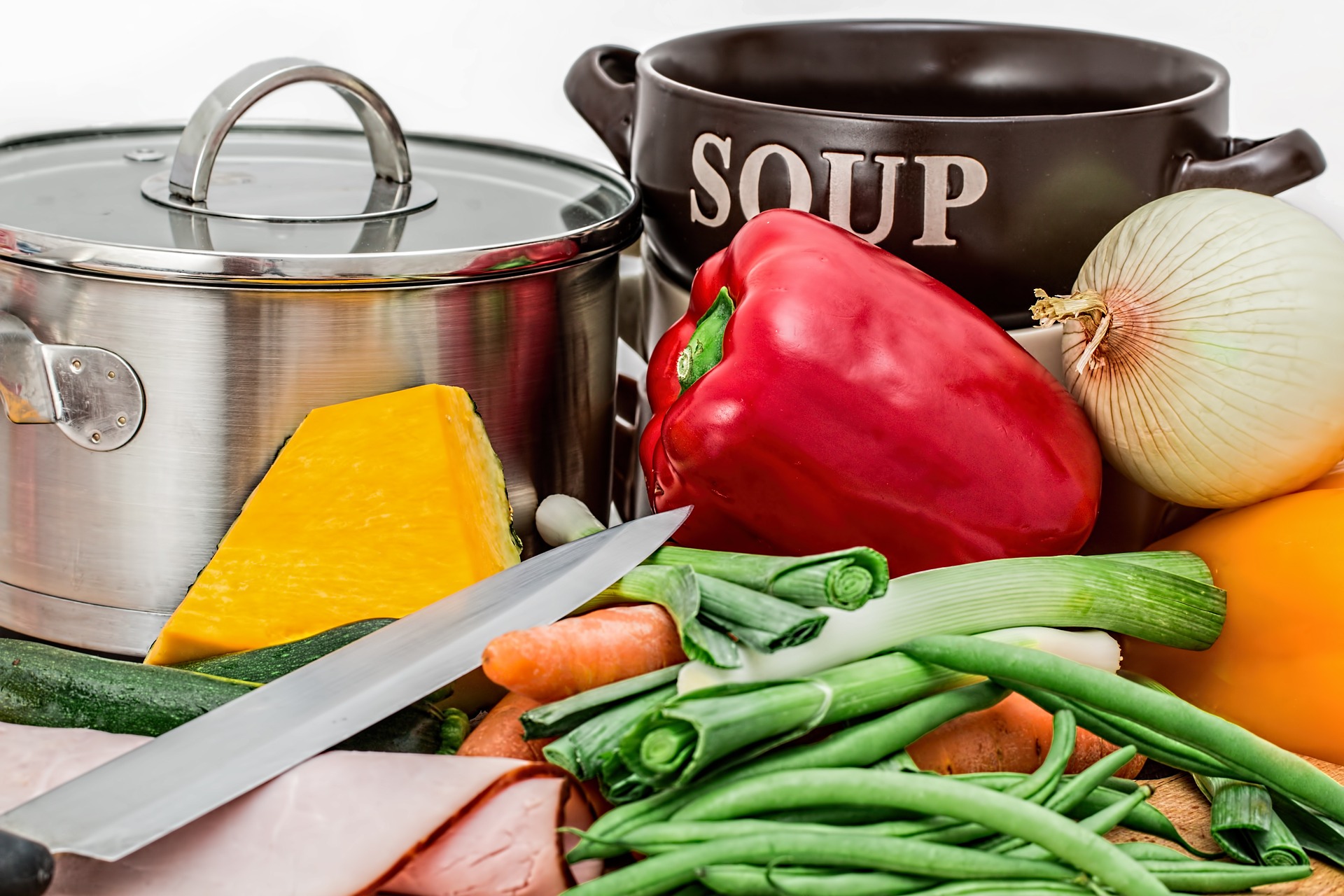
Aside from the wealth of evidence linking meat to cancer, what about foods that actually protect against cancer?
In June 2014 PCRM reported on a study published in the Journal of the American College of Nutrition, that advocates a diet rich in plant-based foods, such as soy beans and cruciferous, allium, and carotenoid vegetables.
“The key recommendation is to build meals around fruits, vegetables, and legumes,” said study author Neal Barnard, M.D., president of the nonprofit Physicians Committee and an adjunct associate professor of medicine at the George Washington University School of Medicine and Health Sciences.
“Plant-based foods provide an antioxidant boost and help promote a healthy weight, reducing the risk for all types of cancer in the long run.”
Among the six dietary recommendations were foods that help to reduce cancer risk:
Guideline #5. Consume soy products to reduce risk of breast cancer and to reduce the risk of recurrence and mortality for women previously treated for breast cancer
Findings: “Evidence from Asian and Western countries shows that soy products are associated with reduced cancer risk. Chinese women who consume more than 11.3 grams of soy protein, equivalent to half a cup of cooked soybeans, each day during adolescence have a 43% reduced risk of premenopausal breast cancer, compared with women who consume 1.7 grams.
“Research in Shanghai shows that women with breast cancer who consume 11 grams of soy protein each day can reduce mortality and risk of recurrence by about 30%. U.S. populations show similar findings: the higher the isoflavone intake from soy products, the less risk of mortality and recurrence in women with breast cancer.
Note: “When choosing soy products, opt for natural forms, such as edamame, tempeh, or organic tofu, as opposed to soy protein concentrates and isolates, common in powders and pills.”
Guideline #6. Emphasize fruits and vegetables to reduce risk of several common forms of cancer.
Findings: “Fruits and vegetables, especially leafy greens, help reduce overall cancer risk. A high intake of cruciferous vegetables, such as broccoli, kale, and cabbage, is associated with an 18% reduced risk of colorectal cancer and reduced risk of lung and stomach cancers.
“Women who consume the most carotenoid-rich vegetables, such as carrots and sweet potatoes, lower their risk of breast cancer by 19%. Overall, women who consume the highest quantities of any kind of fruit or vegetable reduce breast cancer risk by 11%. A high intake of tomato products has been shown to reduce risk of gastric cancer by 27%. Garlic and other allium vegetables, such as onions, significantly reduce risk for gastric cancer, while a Western diet (high amounts of meat and fat with minimal amounts of fruits and vegetables) doubles the risk.”
*We thank and acknowledge Dr Barnard and the Physicians Committee for Responsible Medicine for information about this study and dietary guidelines.
Paleo cops a punch as researchers highlight importance of carbs for human evolution

A new Australian study, recently reported in the Brisbane Times online, questions the Paleo diet’s claimed role in fuelling human evolution, as proposed by Vaclav Smil, author of Should We Eat Meat?: Evolution and Consequences of Modern Carnivory:
“Killing animals and eating meat have been significant components of human evolution that had a synergistic relationship with other key attributes that have made us human, with larger brains, smaller guts, bipedalism and language,” – Vaclav Smil.
However this new study, which was co-written by researchers from the University of Sydney, challenges the belief that meat deserves all the credit for our rapid rise in the evolutionary stakes. According to the researchers, starchy carbohydrates “were essential for the evolution” of the human brain nearly 1 million years ago.
The human brain uses as much as 25% of the body’s energy and up to 60% of blood glucose, the researchers say, which is not consistent with a low-carbohydrate diet.
“The research is a blow to advocates of the Paleo diet, which shuns starch-rich vegetables and grains,” according to the University of Sydney.
“The evidence suggests that Palaeolithic humans would not have evolved on today’s ‘Paleo’ diet,” said Professor Jennie Brand-Miller, one of the study’s co-authors.
“After cooking became widespread, starch digestion advanced and became the source of preformed dietary glucose that permitted the acceleration in brain size,” co-author Professor Les Copeland said.
“There was no one Paleo diet,” said dietitian Dr Joanna McMillan. “Humans were smart enough to learn how to get nutrition from eating certain plant foods by cooking and other means of preparation [soaking for example]. In that we differ from other animal species.”
Dr McMillan expressed her hope that this research will help put an end to the fashion of carb-phobia.
* Refer to our blog post for more information about Paleo vs Plant-based diets.
Risks Associated with Statin Drugs
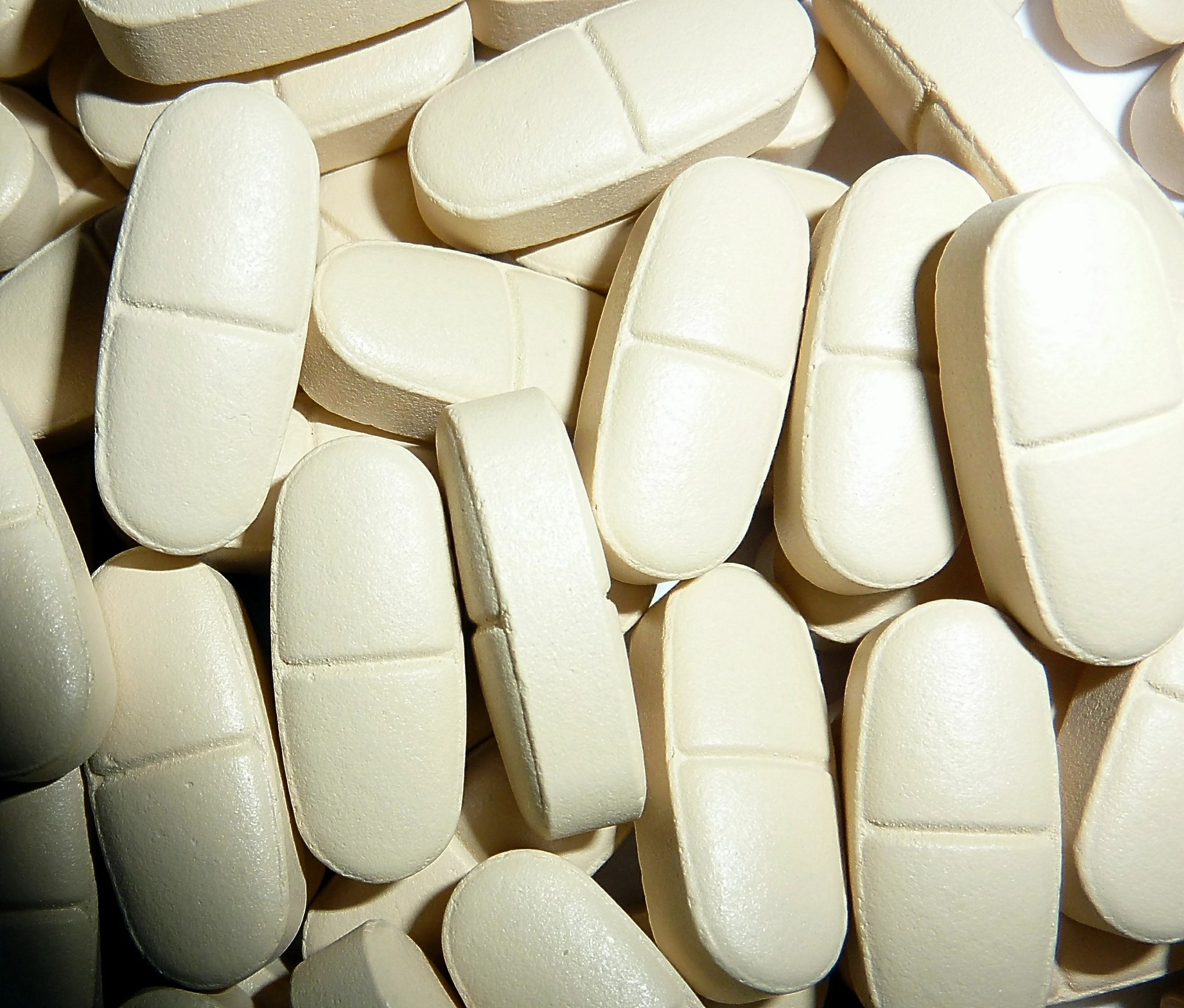
I have taken Lipitor, a statin drug, for over 2 years now. Statins are drugs which block an enzyme in the liver involved in the production of cholesterol. They are very effective, as I can personally attest to, and they are one of the most prescribed types of drugs in the world.
Too much cholesterol in the bloodstream can lead to the build-up of atherosclerotic plaque, and is a major risk factor for heart disease.
In an article by Dr Joel Fuhrman, a 2010 study looked at the medical records of 2 million statin users. The study found “increases in the risk of liver dysfunction, muscle-related side effects, acute kidney injury and cataracts associated with statin use”.
As Dr Fuhrman writes, “larger doses of statin drugs are associated with greater likelihood of side effects, and additional risk factors such as other drugs, older age, diabetes and high triglycerides also increase the likelihood of adverse effect”.
Statins are further implicated in the increase of type-2 diabetes, a muscle pain, reduced fitness, severe breakdown of muscle called ‘rhabdomyolysis’, and even, paradoxically, heart disease.
The alternative to statins, which is a high-fibre, high-nutrient diet including vegetables, fruit and nuts was found to reduce cholesterol by 33% within two weeks.
Dr Fuhrman feels that prescribing statins for increased cholesterol levels “is counterproductive”. He believes that patients taking a statin drug may downplay the importance of lifestyle and dietary changes that would “drastically improve health, life expectancy and quality of life”.
Dr Fuhrman’s firm belief is that a health-promoting diet and lifestyle “not only reduces cholesterol but also reduces blood pressure, reverses heart disease and protects against diabetes, dementia and cancer”.
As always, you should seek the advice of your doctor and other qualified health care professionals for treatment of any medical condition.
Everything in Moderation? Even Heart Disease?
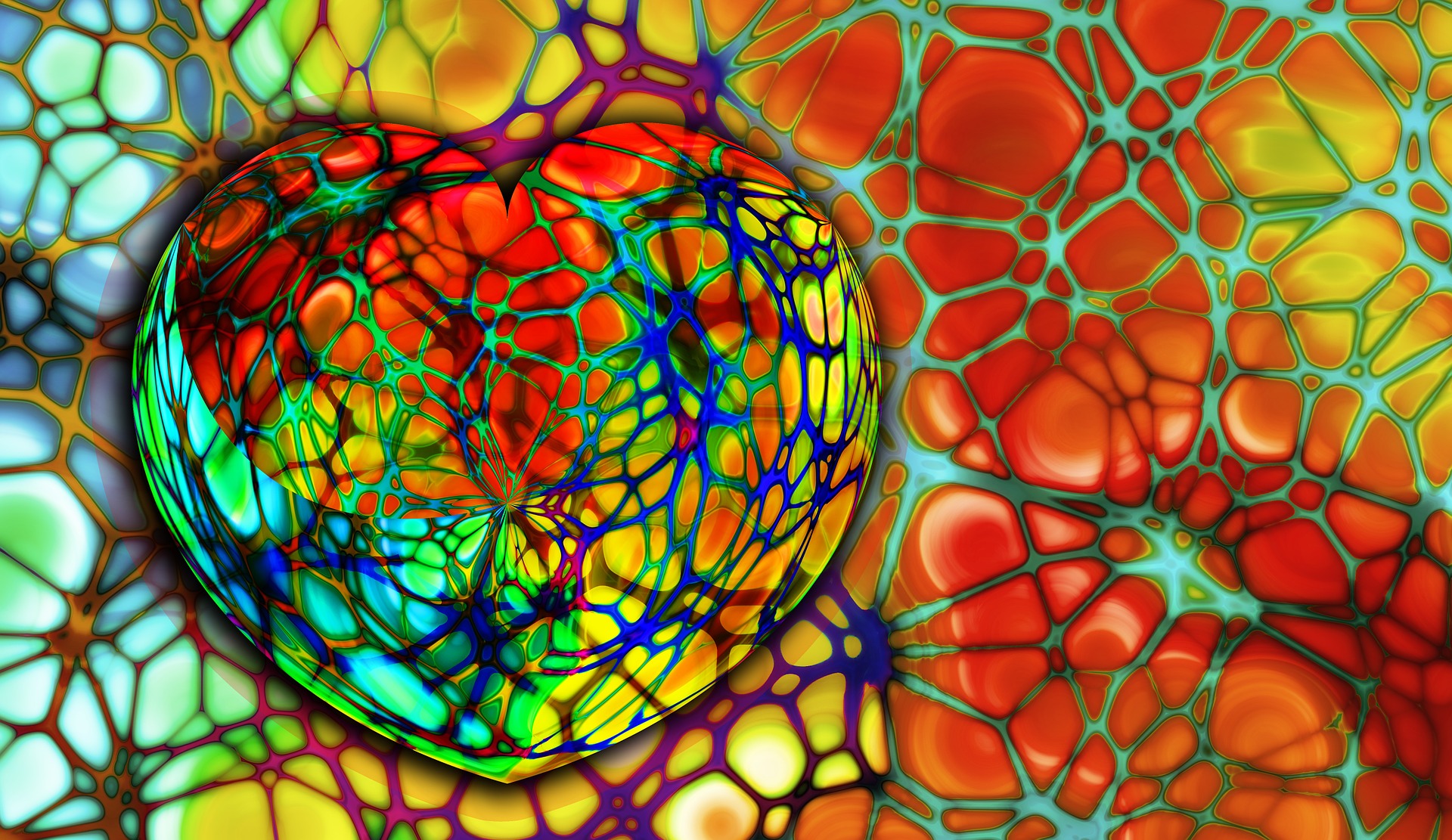 Dr Greger from Nutrition Facts proposes that rather than opt for a ‘low-risk’ chance of heart attacks, perhaps we should aim for ‘no risk’. Dr Greger cites strong evidence that we should keep our cholesterol levels below 150 mg/dl (about 3.9 mmol) to stem coronary heart disease (CHD), rather than the sub-200 mg/dl (about 5.2 mmol) levels as advocated by the American Heart Association.
Dr Greger from Nutrition Facts proposes that rather than opt for a ‘low-risk’ chance of heart attacks, perhaps we should aim for ‘no risk’. Dr Greger cites strong evidence that we should keep our cholesterol levels below 150 mg/dl (about 3.9 mmol) to stem coronary heart disease (CHD), rather than the sub-200 mg/dl (about 5.2 mmol) levels as advocated by the American Heart Association.
As Dr Greger points out, in many cultures heart disease is almost unknown when total serum cholesterol levels are below 150 mg/dl. Few of those develop the disease, and none die of it.
The famous Framingham Heart Study demonstrated that 35% of heart attacks occur in people who have cholesterol levels between 150 mg/dl and 200 mg/dl. This means that a target level of only around 200 mg/dl ensures that millions of US citizens will die of coronary disease.
As we have previously asserted, sometimes cutting back in ‘moderation’ is not going to save lives, and it might even destroy them.
Tom Perry








